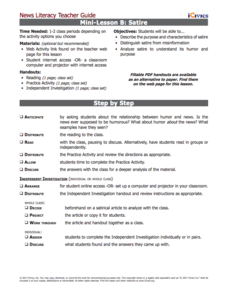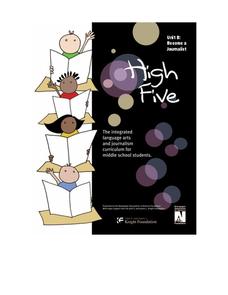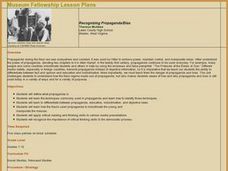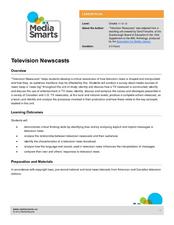Curated OER
Bias vs. Perspective: An Inevitable Aspect of Journalism?
Learners explore the types of media that U.S. teens prefer the ways in which viewers identify and account for journalistic bias. They explore the ways in which media shapes one's opinion or affects their judgment.
Southern Poverty Law Center
Choosing Reliable Sources
It is more important than ever that 21st-century learners develop the skills they need to become savvy consumers of media. Young learners locate and identify reliable sources of information with a helpful media instructional activity.
Curated OER
Focus on the Media
Students critically examine news articles and editorials for attitudes of discrimination and prejudice. Students then complete checklist in which they analyze news reports for context, content, point of view, language, graphics, and...
iCivics
Mini-Lesson B: Satire
Hey, what's so funny? Explore the use of satire in a variety of media with a hands-on lesson. Fourth in a five-part journalism series from iCivics, the activity introduces satirical language in print and online. Pupils work alone or in...
News Literacy Project
Fact-Check It!
Here's a lesson designed to help learners develop their digital verification skills. First, expert groups study specific digital verification skills, and in a jigsaw activity, share what they have learned with classmates. The jigsaw...
Online Publications
Become a Journalist
Explore the newspaper as a unique entity with a detailed and extended unit. The unit requires learners to consider the newspaper's role in democracy, think about ethics, practice writing and interviewing, and examine advertising and news...
Curated OER
Discussion: The Media
In this discussion about media worksheet, learners participate in a discussion about different types of media.
Newseum
Civil Rights News Coverage: Looking Back at Bias
Not all southern newspapers covered the civil rights movement of the 1950s and 1960s. Young journalists investigate how The Lexington (Ky. Herald-Leader and The Jackson (Tenn.) Sun re-examined their coverage of the movement. After...
Southern Poverty Law Center
Evaluating Online Sources
All sources are pretty much the same, right? If this is how your class views the sources they use for writing or research projects, present them with a media literacy lesson on smart source evaluation. Groups examine several articles,...
Curated OER
Exploring Media: Understanding and Identifying Editorial Perspective in Television and Radio News
Students research the topics Boat People: A Refugee Crisis, Dr. Henry Morgentaler: Fighting Canada's Abortion Laws, and CANDU: The Canadian Nuclear Reactor on the CBC Radio and Television Archives Web site.
Curated OER
Clothing-Based Bias
Students investigate stereotypes attached to clothing. In this teaching tolerance lesson students explore how the way someone dresses can influence other people's perception of that person. Students discuss what groups of people might be...
Anti-Defamation League
The Hate U Give
The Hate U Give by Angie Thomas became a quick hit in the young adult literature genre before its adaptation in the 2018 film of the same name. Use a thorough instructional activity, discussion guide, and series of activities to discuss...
Curated OER
Citizens and the Media / Lesson : 3 Compare and Contrast Daily Newspapers for fact, opinion and bias
Students compare and contrast a variety of daily newspapers in order to detect bias. They critically analyze the role the media plays in responsibly reporting government activities.
American Press Institute
In the Newsroom: The Fairness Formula
Reporting the news is easy, right? Think again! Show young scholars the difficult choices journalists make every day through a lesson that includes reading, writing, and discussion elements. Individuals compare the language and sources...
Curated OER
Recognizing Propaganda/Bias
Middle and high schoolers examine the uses of propaganda during the Nazi era. Using examples of propaganda used by Hitler, they discuss how it changed the thinking and ideas of people exposed to it. In groups, they identify how and why...
Southern Poverty Law Center
Evaluating Reliable Sources
A lesson plan instills the importance of locating reliable sources. Scholars are challenged to locate digital sources, analyze their reliability, search for any bias, and identify frequently found problems that make a source unusable.
Curated OER
Television Newscasts
When we watch news broadcasts on television, we receive a much more visual perspective than when we read the newspaper. How do sets, clothing, and music contribute to our understanding of the story? Compare American and Canadian news...
Curated OER
Parliamentary Newsroom : Developing Media Literacy
Students explain and examine the selection, development, sources, transmission and impact of news on the public. They write a brief essay on the topic: "The Public Must Be Critical In Their Assessment of the News Before Drawing...
Curated OER
Understanding Propaganda
Students define propaganda and give examples from the mass media. In this propaganda lesson, students review examples of propaganda and then research versions of it in the mass media.
iCivics
Lesson 2: Misinformation
Fake news is a hot topic right now ... but what is it? Intrepid young investigators track down the facts that separate journalistic mistakes and misinformation through reading, research, and discussion. Part three in a five-instructional...
Media Smarts
TV Dads: Immature and Irresponsible?
Examine gender stereotypes on television, focusing on fathers portrayed in sitcoms and advertising. Questions on a handout direct learners to consider the types of fathers they see on television and one advertisement is highlighted as...
Academy of American Poets
Teach This Poem: “Making History” by Marilyn Nelson
What makes an event newsworthy, worth a reference in a news magazine or textbook? Who decides? These are questions Marilyn Nelson asks readers of her poem "Making History" to consider. To begin, class members list details they notice in...
Curated OER
World Media: Comparison of Iraq War Accounts
Students are introduced to the concept of news/media bias from region to region. Upon reading differing articles, students answer source questions on the structure/content of each article.
Curated OER
A Media Literacy Unit on "Turn Beauty Inside Out"
Students become aware of the importance of distinguishing between inner and outer beauty. They explore how the media's opinion of beauty is biased and should be evaluated rather than just accepted. Each student also assesses how the...
Other popular searches
- Bias in the Media
- Media Bias Iraq War
- Bias in the News Media
- News Bias and Discrimination
- Identifying Media Bias
- Detecting Media Bias
- News Bias
- Iraq Media Bias
- Iran Media Bias
- Television News Bias
- Bias in News Media
- Bias in News Media Race





